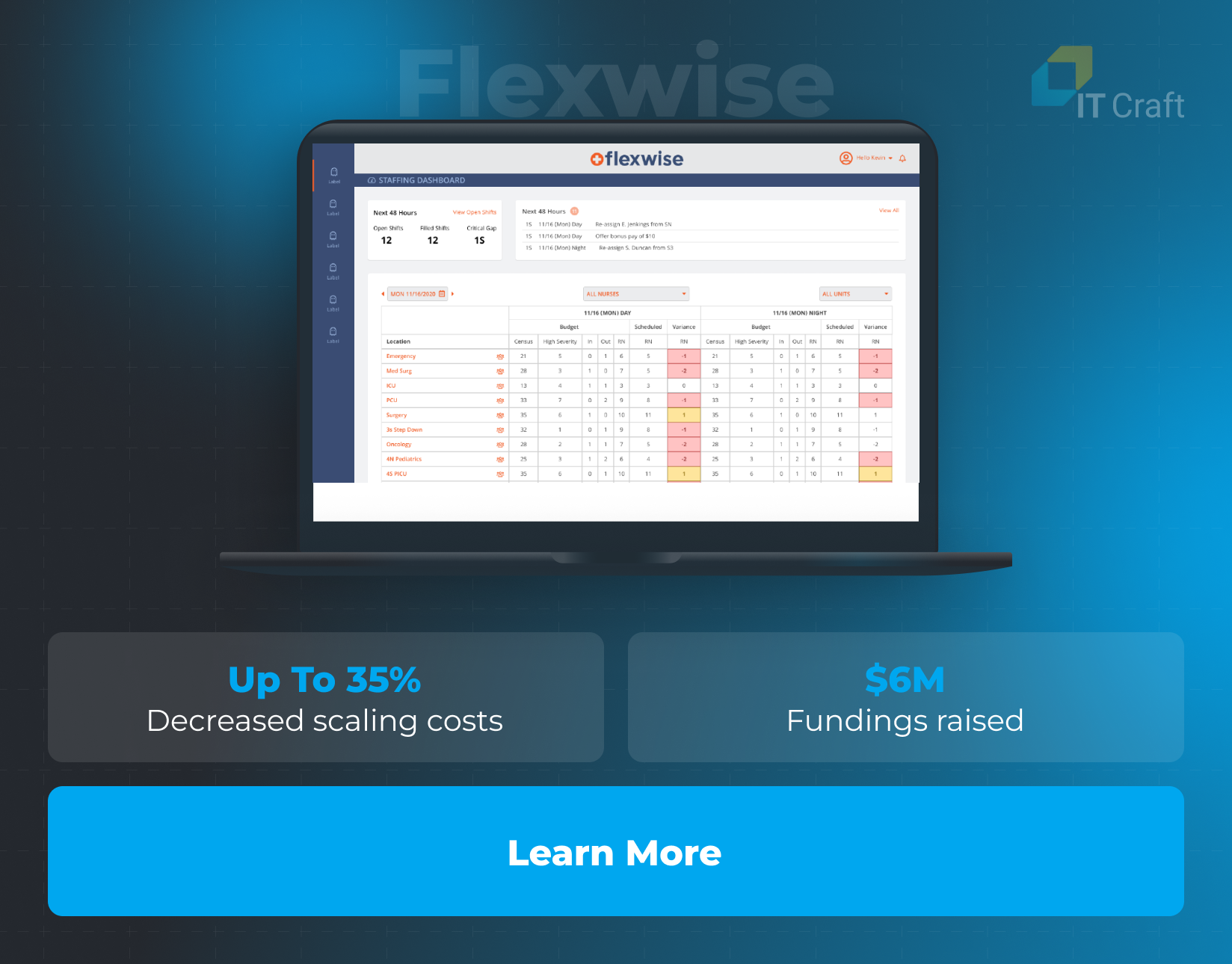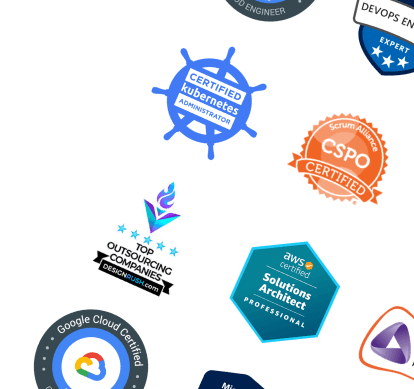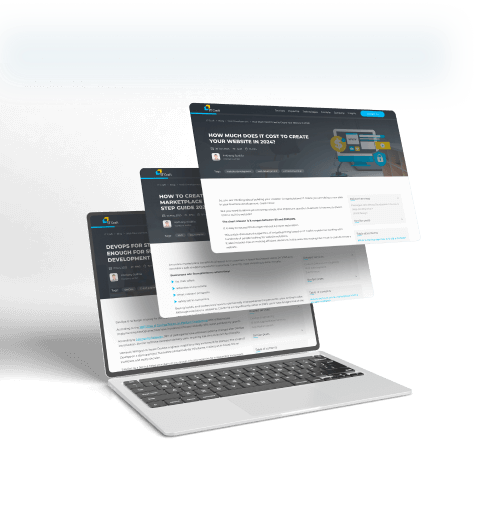Accenture reveals that AI could be augmented by AI 40% of healthcare providers’ work hours, and according to Forbes, it could save the US medical sector around $200 billion yearly.
In healthcare, AI systems leverage machine learning techniques to analyze various unstructured data, including patient records, medical imagery, and audio recordings from consultations.
These systems generate new insights and content, drawing on their extensive training datasets and algorithms. This process enhances decision-making and patient care by providing healthcare professionals with deeper, data-driven understandings.
This article details how AI technology can aid healthcare organizations.
1
What Is Artificial Intelligence in Healthcare?
Artificial intelligence (AI) in healthcare combines sophisticated algorithms and computational intelligence to support, enhance, and potentially revolutionize medical care and research.
In a sector as critical as healthcare, AI promises to bring about significant changes by improving accuracy, efficiency, and outcomes.
At its core, AI in healthcare involves using machine learning (ML), natural language processing (NLP), and other AI technologies to process and analyze vast amounts of healthcare data.
This data can range from patient medical records and treatment histories to research studies and clinical trial results.
Key applications of AI in healthcare Include:
- Disease Diagnosis and Risk Assessment
AI algorithms can analyze medical images, such as X-rays, MRIs, and CT scans, more quickly and accurately than doctors.
- Treatment Personalization
AI systems can analyze data from various patients to identify which treatments are most effective for specific conditions. This approach supports personalized medicine, tailoring treatments to individual patients’ needs and genetic profiles.
- Drug Discovery and Development
In the pharmaceutical industry, AI accelerates drug discovery by predicting how drugs react to diseases, leading to more efficient and cost-effective research.
The US Congressional Budget Office reports that developing a new drug costs between $1 billion and $2 billion when factoring in the cost of unsuccessful drugs.
However, AI is showing promise in reducing the time required for designing and screening new drugs by nearly 50%, potentially saving the pharmaceutical industry approximately $26 billion each year.
AI optimizes hospital operations by managing patient flow, staffing, and medical inventory, reducing costs and improving patient care.
- Telemedicine and Remote Monitoring
AI-powered telemedicine tools enable remote diagnosis and monitoring of patients, expanding healthcare access, especially in underserved areas.
- Healthcare Bots and Virtual Assistants
These AI tools provide immediate responses to patient queries, schedule appointments, and offer basic healthcare advice, enhancing patient engagement and service efficiency.
AI in healthcare has the potential to lighten the load on doctors by automating administrative duties. This streamlines processes and cuts down on administrative expenses, which HealthAffairs reports constitute 15% to 30% of total healthcare expenditures.
AI analyzes patterns and trends in healthcare data to predict future healthcare needs, epidemics, and outcomes, helping with better planning and resource allocation.
AI enhances the precision and control of surgical robots, allowing for minimally invasive procedures, reduced recovery times, and improved surgical outcomes.
Unlock the Power of AI for Healthier Outcomes
Empower your healthcare operations with AI. Our expert services enable you to innovate and optimize for smarter healthcare solutions.
Explore Solutions
2
Types of AI in Healthcare
The field of AI in healthcare encompasses a variety of technologies, each with unique applications and benefits. Understanding the available technologies will help you grasp the full scope of AI’s impact on healthcare.

AI-powered chatbots are transforming patient interactions and service.
- Automated Patient Support: Providing instant responses to patient inquiries, improving patient engagement and satisfaction.
- Health Monitoring and Alerts: Continuously monitoring patient health data and sending alerts on anomalies, aiding in proactive healthcare management.
Cognitive computing mimics human thought processes, and in healthcare, it is used for:
- Clinical Decision Support: Assisting doctors in making informed decisions by providing evidence-based treatment options and diagnostics.
- Drug Development: Accelerating the discovery of new drugs and therapies by analyzing complex biomedical information.
In healthcare, robotics has numerous applications, such as:
- Robotic Surgery: Assisting surgeons with precision and flexibility, leading to minimally invasive procedures and improved patient outcomes.
- Rehabilitation Robots: Aiding in the physical therapy and rehabilitation of patients with mobility issues.
Machine learning, a core component of AI, involves algorithms learning from data to make predictions or decisions. In healthcare, ML is instrumental in:
- Predictive Analytics: Analyzing patient data to predict health outcomes or risks, which is vital for preventive medicine and personalized care.
- Image Analysis: Enhancing diagnostic accuracy in radiology and pathology by interpreting medical images such as X-rays and MRIs.
- Natural Language Processing (NLP)
NLP enables computers to understand and interpret human language, making it valuable for:
- Medical Record Analysis: Extracting valuable insights from unstructured data in electronic health records (EHRs), such as doctors’ notes or clinical reports.
- Chatbots and Virtual Health Assistants: Providing assistance and information to patients and healthcare professionals through intelligent conversational agents.
A subset of ML, deep learning is particularly effective in:
- Advanced Image Recognition: Identifying patterns and anomalies in medical imaging more accurately than traditional methods.
- Genomics and Personalized Medicine: Analyzing genetic data to tailor treatments to individual genetic profiles.
Each AI technology is vital in advancing healthcare, offering solutions to some of the industry’s most pressing challenges and paving the way for a more efficient, accurate, and patient-centric healthcare system.
-

Discover how IT Craft's AI consulting services can revolutionize your business. Optimize processes and spearhead innovation by tapping into the transformative power of artificial intelligence.
3
Exploring the Advantages of AI in Healthcare
Integrating AI in healthcare has brought many benefits, revolutionizing how care is delivered and managed. These advantages enhance patient outcomes and streamline healthcare processes, making them more efficient and cost-effective.

- Improved Diagnostic Accuracy
- Early Disease Detection: For the early identification of conditions such as cancer and heart disease, medical images can be meticulously analyzed by AI algorithms, enhancing precision in detection.
- Fewer Diagnostic Errors: By providing second opinions and analyzing vast datasets, AI reduces human error in diagnoses, improving patient safety.
- Tailored Treatment Plans: AI analyzes patient data, including genetic information, to suggest personalized treatment plans, increasing therapy effectiveness.
- Drug Personalization: Analyzing an individual’s unique genetic composition and medical history can determine personalized medication and dosage plans, with AI playing a pivotal role in this customization process.
- Enhanced Patient Care and Monitoring
- Remote Monitoring: AI-powered wearable devices and apps enable continuous monitoring of patient vitals, facilitating proactive management of chronic conditions.
- Predictive Care: Potential health issues can be anticipated and addressed proactively through predictive care, where AI’s foresight makes preventive measures and timely interventions possible.
- Operational Efficiency in Healthcare Facilities
- Streamlined Workflow: AI automates administrative tasks like scheduling, billing, and patient record management, freeing healthcare professionals to focus on patient care.
- Resource Optimization: Optimizing the allocation of resources, such as staff scheduling and the use of equipment, is significantly enhanced by AI, leading to improved efficiency within healthcare facilities.
- Drug Discovery and Research
- Accelerated Drug Development: AI speeds up drug discovery by predicting how different compounds react, reducing the time and cost of bringing new drugs to market.
- Advanced Research Capabilities: By rapidly analyzing extensive medical research data, new insights and potential treatments for various diseases are uncovered, showcasing the advanced research capabilities facilitated by AI.
- Telemedicine and Virtual Health Assistance: AI enables remote consultations and virtual health assistance, making healthcare more accessible, especially in underserved areas.
- Global Health Insights: AI aggregates global health data, providing insights to guide public health policies and initiatives.
Enhance Healthcare with AI Expertise
Elevate patient care with cutting-edge AI. Tap into our specialized services for advanced diagnostics and predictive health analytics.
Hire AI Experts
4
Challenges of AI in Healthcare
While AI in healthcare offers numerous benefits, it also faces several challenges that must be addressed to maximize its potential. These range from technical and ethical considerations to practical implementation issues.
- Data Privacy and Security
- Protecting Patient Data: Ensuring the privacy and security of patient data is paramount, as AI systems often require access to sensitive health information.
- Risk of Data Breaches: Increased use of AI in healthcare raises the risk of data breaches, which could have serious consequences for patient privacy.
- Technical Limitations and Reliability
- Accuracy and Dependability: Ensuring AI systems are accurate and reliable enough for making critical healthcare decisions is a significant challenge.
- Interpretability of AI Decisions: Many AI models, especially deep learning models, are often seen as black boxes, making it difficult to understand how they arrive at certain conclusions.
- Integration with Existing Healthcare Systems
- Compatibility with Current Systems: Integrating AI technologies with healthcare IT systems can be complex and costly.
- Workflow Disruption: Introducing AI into healthcare workflows can disrupt established practices and require significant changes to routine operations.
- Skill Gaps and Training Needs
- Need for Specialized Skills: Implementing and managing AI solutions in healthcare requires specialized skills that current healthcare professionals may need to gain.
- Training and Education: Healthcare providers often need extensive training and education to understand and effectively use AI tools.
- High Implementation Costs: Developing and implementing AI solutions can be expensive, making such solutions inaccessible to smaller healthcare providers.
- Accessibility Issues: There is a risk that AI in healthcare could widen health disparities if AI technologies are not accessible to all population segments.
-

Leveraging our expertise, we address these potential drawbacks, paving the way for smoother, more efficient AI integration in healthcare settings.
5
AI Implementation Use Cases in the Healthcare Sector

- Enhancing Medical Queries
Like tech support, health applications can leverage AI to provide expert medical assistance through chatbots. Google’s Med-PaLM is an exemplary AI model that delivers detailed medical answers and composes extensive summaries after analyzing vast sets of medical documents.
Trained on medical data and vetted through medical exams and research, Med-PaLM is being tested by Mayo Clinic doctors. While promising, it’s currently best suited as a supportive tool in everyday healthcare.
- Advancing Radiological Analysis
AI models are key to enhancing the quality of medical images, aiding radiologists in making more precise diagnoses, especially when dealing with low-quality images.
Employing these models to automate the creation of radiological reports significantly enhances the efficiency of the radiology department’s reporting process. This improvement allows radiologists to conduct more daily patient examinations, optimizing workflow and patient care.
- Accelerating Drug Development and Research
AI is revolutionizing how pharmaceutical companies expedite drug discovery and testing. AI models are instrumental in protein engineering, decoding DNA sequences, and examining generics.
This aids researchers in identifying nuanced links between drug ingredients and human health.
For example, biotech startup Evozyne employs generative AI to simulate protein evolution, aiding in identifying prime drug development candidates.
- Tailored Personalized Medicine
AI’s powerful genetic, clinical, and lifestyle data analysis empowers healthcare professionals to develop individualized treatment plans.
This approach optimizes health outcomes and significantly reduces the risk of side effects, marking a new era in patient-centric care.
- Streamlined Healthcare Operations Management
In the realm of healthcare administration, AI is transforming efficiency.
By automating tasks like appointment scheduling, resource allocation, and supply chain management, AI is revolutionizing the operational backbone of healthcare facilities, leading to improved service delivery and reduced overhead.
- Improved Medical Diagnostics
Integrating AI in healthcare diagnostics — particularly in radiology, pathology, dermatology, and ophthalmology — is highly beneficial. The use of AI, especially in processing CT and ultrasound images, is easing the workload of medical professionals and enhancing diagnostic accuracy.
Google’s healthcare AI project includes an AI algorithm for analyzing medical images like X-rays and CT scans to detect various diseases. DermAssist, also by Google, allows users to perform preliminary skin condition assessments by answering a few questions and providing photos.
- AI-Enhanced Mental Health Applications
AI-driven applications redefine mental health care by providing comprehensive support through virtual therapy sessions, monitoring mood patterns, and offering customized intervention strategies.
This innovative approach ensures accessible and personalized mental health care for diverse patient needs.
- Pioneering Genomic Analysis with AI
AI’s application in genomic analysis is groundbreaking, offering insights into genetic predispositions and disease risk assessment.
This technology enables healthcare professionals to devise highly personalized treatment plans tailored to the unique genetic makeup of individual patients, heralding a new frontier in precision medicine.
6
Envisioning the Future of AI in Healthcare
The future of AI in healthcare points toward a landscape where technology and medicine are intricately intertwined, promising unprecedented advancements in patient care and medical research. As we look ahead, several key developments are set to shape this future:
- Expansion of Telemedicine: AI will further enhance telemedicine, enabling more sophisticated remote diagnostics and patient monitoring and making healthcare accessible across distances.
- Personalized Treatment Plans: Leveraging genetic information and lifestyle data, AI will facilitate highly customized treatment plans, improving patient outcomes and reducing side effects.
- Advancements in Precision Surgery: With improvements in AI, robotic surgeries will become even more precise, expanding into new specializations and procedures with higher success rates.
- Integration of Predictive Analytics: AI’s predictive analytics will become integral in preventing diseases, managing chronic conditions, and predicting outbreaks, shifting the focus from treatment to prevention.
- Empowering Mental Health Services: AI-driven tools will offer new ways to diagnose and treat mental health issues, providing support through therapy bots and personalized mental health management plans.
- Accelerated Drug Discovery: AI will continue to shorten the drug development cycle, reducing costs and the time to market for new drugs and enabling rapid responses to emerging health crises.
- Enhanced Medical Imaging: AI will bring about more sophisticated image analysis techniques, detecting conditions earlier and with greater accuracy.
- Ethical AI Use: There will be a concerted effort to address ethical considerations, ensuring AI is used responsibly and equitably in healthcare.
- Interoperable Health Records: AI will drive the creation of fully interoperable health records, providing a unified view of patient data and facilitating more coordinated care.
7
Our expertise
Flexwise Health: Revolutionizing Workforce Optimization in Healthcare
Flexwise Health, a US-based workforce optimization solution, has been redefining the healthcare industry since 2018. With a dedicated team of 17 specialists, this project caters to healthcare administrators, streamlining employee management and enhancing operational efficiency.
Technical Evolution:
- The DevOps team, led by an IT Craft Certified Cloud Architect, collaborated closely with developers to restructure the software into microservices and transition to cloud-based operations.
- This shift facilitated smoother integrations and enhanced infrastructure management.
Main Project Features:
- Flexwise Predict: An AI-driven tool that accurately forecasts patient demand and staffing needs up to 16 months out.
- Flexwise Align: Streamlines the facility workflow, offering administrators a comprehensive view of staffing options and decision-making support.
- Flexwise Connect: Supports core team engagement and supervision with features like chat messaging, timesheet management, and task reassignment; adaptable to various departmental workflows.
Impact on Healthcare Management:
- Data-Driven Forecasting: Using data science to anticipate patient demands enables cost-effective, high-quality care.
- Open Shift Management & Visibility: Enhanced job assignment flexibility and transparency in staffing across departments.
Flexwise Health enables administrators to minimize employment risks and optimize workflows. It efficiently manages float pools and assists in predicting staffing needs using historical data and patient demand forecasts.

!
Conclusion
In 2024, AI has significantly advanced healthcare, markedly enhancing diagnostics, personalizing treatments, and boosting hospital efficiency.
These technological advancements are reshaping healthcare systems to be more effective and responsive, promising a future of improved patient care and innovative medical practices.
Emerging AI trends in healthcare are shifting the focus towards preventive care and chronic disease management. Addressing AI’s ethical and practical aspects remains crucial as the medical sector embraces these innovations.
This evolution in AI promises revolutionary changes, aiming to elevate global standards of patient care significantly.








